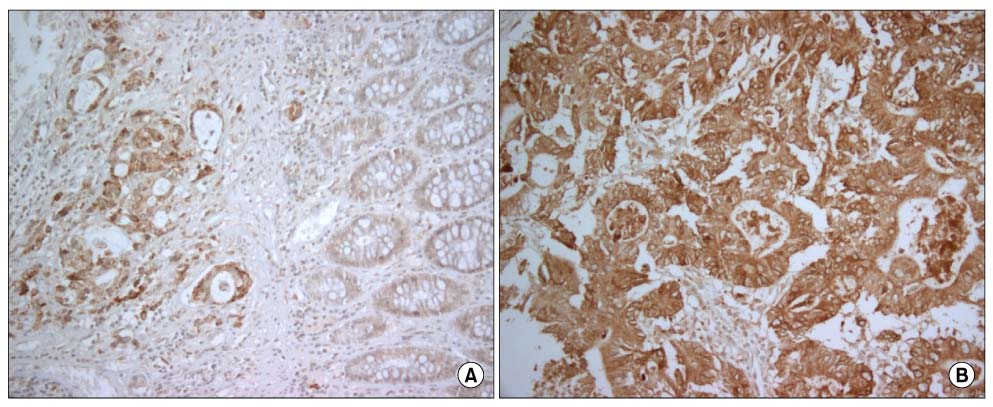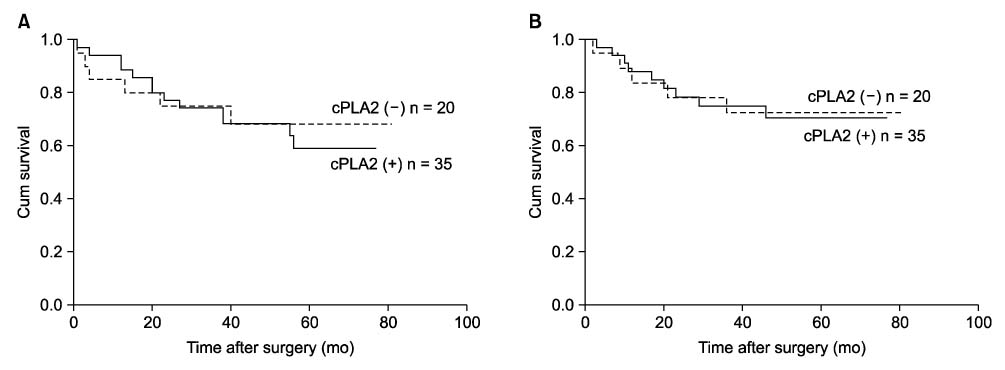J Korean Surg Soc.
2011 Jun;80(6):397-403. 10.4174/jkss.2011.80.6.397.
Prognostic significance of cytosolic phospholipase A2 expression in patients with colorectal cancer
- Affiliations
-
- 1Department of Surgery, Chosun University College of Medicine, Gwangju, Korea. kjkim@chosun.ac.kr
- 2Department of Pathology, Chosun University College of Medicine, Gwangju, Korea.
- KMID: 2212184
- DOI: http://doi.org/10.4174/jkss.2011.80.6.397
Abstract
- PURPOSE
Cyclooxygenase-2 is believed to be an important enzyme in the pathogenesis of colorectal cancer (CRC). Cytosolic phospholipase A2 (cPLA2), also, have been suggested to be related to the carcinogenesis of CRC. The aim of this study was to investigate cPLA2 expression and its relationship with prognostic significance in CRC.
METHODS
Eighty-eight patients with colorectal cancer who underwent curative surgery were enrolled in this study. cPLA2 was examined in 88 primary CRCs by immunohistochemistry and we compared their expression with clinicopathologic findings, recurrence and survival in patients with CRC.
RESULTS
The expression of cPLA2 was positive in 54.5% (48/88). The expression of cPLA2 was not correlated with clinicopathologic parameters. However, cPLA2 expression was significantly related with vascular endothelial growth factor expression. Kaplan-Meier analysis didn't show any clinical significance in disease-free survival and overall survival according to cPLA2 expression.
CONCLUSION
These results suggest that cPLA2 expression was not associated with the prognosis of CRC. However, further large-scale studies are needed to clarify the prognostic effect of cPLA2 in CRC.
MeSH Terms
-
Calcium Hydroxide
Colorectal Neoplasms
Cyclooxygenase 2
Cytosol
Disease-Free Survival
Humans
Immunohistochemistry
Kaplan-Meier Estimate
Phospholipases
Phospholipases A2
Prognosis
Recurrence
Vascular Endothelial Growth Factor A
Zinc Oxide
Calcium Hydroxide
Cyclooxygenase 2
Phospholipases
Phospholipases A2
Vascular Endothelial Growth Factor A
Zinc Oxide
Figure
Reference
-
1. Boyle P, Zaridze DG, Smans M. Descriptive epidemiology of colorectal cancer. Int J Cancer. 1985. 36:9–18.2. Boyle P, Leon ME. Epidemiology of colorectal cancer. Br Med Bull. 2002. 64:1–25.3. Ministry for Health, Welfare and Family Affairs. Annual report of cancer incidence (2007), cancer prevalence (2007) and survival (1993-2007) in Korea. 2009. Seoul: Ministry for Health, Welfare and Family Affairs.4. Williams CS, Mann M, DuBois RN. The role of cyclooxygenases in inflammation, cancer, and development. Oncogene. 1999. 18:7908–7916.5. Balsinde J, Balboa MA, Insel PA, Dennis EA. Regulation and inhibition of phospholipase A2. Annu Rev Pharmacol Toxicol. 1999. 39:175–189.6. Leslie CC. Properties and regulation of cytosolic phospholipase A2. J Biol Chem. 1997. 272:16709–16712.7. Panel V, Boëlle PY, Ayala-Sanmartin J, Jouniaux AM, Hamelin R, Masliah J, et al. Cytoplasmic phospholipase A2 expression in human colon adenocarcinoma is correlated with cyclooxygenase-2 expression and contributes to prostaglandin E2 production. Cancer Lett. 2006. 243:255–263.8. Lim SC, Cho H, Lee TB, Choi CH, Min YD, Kim SS, et al. Impacts of cytosolic phospholipase A2, 15-prostaglandin dehydrogenase, and cyclooxygenase-2 expressions on tumor progression in colorectal cancer. Yonsei Med J. 2010. 51:692–699.9. Choi JY, Jang KT, Shim YM, Kim K, Ahn G, Lee KH, et al. Prognostic significance of vascular endothelial growth factor expression and microvessel density in esophageal squamous cell carcinoma: comparison with positron emission tomography. Ann Surg Oncol. 2006. 13:1054–1062.10. Bennett A, Civier A, Hensby CN, Melhuish PB, Stamford IF. Measurement of arachidonate and its metabolites extracted from human normal and malignant gastrointestinal tissues. Gut. 1987. 28:315–318.11. Soydan AS, Tavares IA, Weech PK, Temblay NM, Bennett A. High molecular weight phospholipase A2 and fatty acids in human colon tumours and associated normal tissue. Eur J Cancer. 1996. 32A:1781–1787.12. Wendum D, Svrcek M, Rigau V, Boëlle PY, Sebbagh N, Parc R, et al. COX-2, inflammatory secreted PLA2, and cytoplasmic PLA2 protein expression in small bowel adenocarcinomas compared with colorectal adenocarcinomas. Mod Pathol. 2003. 16:130–136.13. Wendum D, Comperat E, Boëlle PY, Parc R, Masliah J, Trugnan G, et al. Cytoplasmic phospholipase A2 alpha overexpression in stromal cells is correlated with angiogenesis in human colorectal cancer. Mod Pathol. 2005. 18:212–220.14. Takaku K, Sonoshita M, Sasaki N, Uozumi N, Doi Y, Shimizu T, et al. Suppression of intestinal polyposis in Apc(delta 716) knockout mice by an additional mutation in the cytosolic phospholipase A(2) gene. J Biol Chem. 2000. 275:34013–34016.15. Hong KH, Bonventre JC, O'Leary E, Bonventre JV, Lander ES. Deletion of cytosolic phospholipase A(2) suppresses Apc(Min)-induced tumorigenesis. Proc Natl Acad Sci U S A. 2001. 98:3935–3939.16. Dong M, Guda K, Nambiar PR, Rezaie A, Belinsky GS, Lambeau G, et al. Inverse association between phospholipase A2 and COX-2 expression during mouse colon tumorigenesis. Carcinogenesis. 2003. 24:307–315.17. Ilsley JN, Nakanishi M, Flynn C, Belinsky GS, De Guise S, Adib JN, et al. Cytoplasmic phospholipase A2 deletion enhances colon tumorigenesis. Cancer Res. 2005. 65:2636–2643.18. Osterström A, Dimberg J, Fransén K, Söderkvist P. Expression of cytosolic and group X secretory phospholipase A(2) genes in human colorectal adenocarcinomas. Cancer Lett. 2002. 182:175–182.19. Dong M, Johnson M, Rezaie A, Ilsley JN, Nakanishi M, Sanders MM, et al. Cytoplasmic phospholipase A2 levels correlate with apoptosis in human colon tumorigenesis. Clin Cancer Res. 2005. 11:2265–2271.20. Dimberg J, Samuelsson A, Hugander A, Söderkvist P. Gene expression of cyclooxygenase-2, group II and cytosolic phospholipase A2 in human colorectal cancer. Anticancer Res. 1998. 18(5A):3283–3287.21. Yu HG, Huang JA, Yang YN, Luo HS, Yu JP, Meier JJ, et al. Inhibition of cytosolic phospholipase A2 mRNA expression: a novel mechanism for acetylsalicylic acid-mediated growth inhibition and apoptosis in colon cancer cells. Regul Pept. 2003. 114:101–107.22. Buhmeida A, Bendardaf R, Hilska M, Laine J, Collan Y, Laato M, et al. PLA2 (group IIA phospholipase A2) as a prognostic determinant in stage II colorectal carcinoma. Ann Oncol. 2009. 20:1230–1235.23. Kawamoto S, Shoji M, Setoguchi Y, Kato M, Hashizume S, Ichikawa A, et al. Molecular cloning of the 31 kDa cytosolic phospholipase A2, as an antigen recognized by the lung cancer-specific human monoclonal antibody, AE6F4. Cytotechnology. 1995. 17:103–108.24. Wu T, Han C, Lunz JG 3rd, Michalopoulos G, Shelhamer JH, Demetris AJ. Involvement of 85-kd cytosolic phospholipase A(2) and cyclooxygenase-2 in the proliferation of human cholangiocarcinoma cells. Hepatology. 2002. 36:363–373.25. Chen J, Yuan YW, Zhang JR, Zhou DY. Up-regulation of c-myc expression in MCF-7/Adr human breast cancer cells and its association with resistance against doxorubicin. Di Yi Jun Yi Da Xue Xue Bao. 2002. 22:124–126.26. Sved P, Scott KF, McLeod D, King NJ, Singh J, Tsatralis T, et al. Oncogenic action of secreted phospholipase A2 in prostate cancer. Cancer Res. 2004. 64:6934–6940.
- Full Text Links
- Actions
-
Cited
- CITED
-
- Close
- Share
- Similar articles
-
- Moxifloxacin Alleviates Oleic Acid-provoked Neutrophilic Respiratory Burst in the Rat Lung through the Inhibition of Cytosolic Phospholipase A2
- Impacts of Cytosolic Phospholipase A2, 15-Prostaglandin Dehydrogenase, and Cyclooxygenase-2 Expressions on Tumor Progression in Colorectal Cancer
- The Production of Phospholipase A2 in Different Types of Cultured Human Intervertebral Disc Cells
- Changes in the Activity and Expression of Cytosolic Pospholipase A2 in Human Amnion at Parturition
- Activation of Neutrophil Menbrane Phospholipase D by Soluble Proteins: Comparison of Cytosolic Neutrophil 50 kDa Factor , ADP-ribosylation Factor and a Novel Brain Factor



